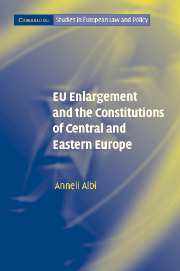Book contents
- Frontmatter
- Contents
- List of tables
- Series Editors' Preface
- Acknowledgements
- Table of cases
- Table of treaties, laws and other instruments
- List of abbreviations
- Introduction
- 1 Overview of the accession process
- 2 Constitutional adaptations in the ‘old’ Member States
- 3 Some idiosyncrasies of CEE constitutions
- 4 Constitutional issues in the pre-accession period
- 5 Revision of CEE constitutions for EU membership
- 6 Theoretical views of sovereignty and democratic legitimacy in CEE
- 7 Referendums
- 8 Membership of NATO and other international organisations
- 9 Role of Constitutional Courts
- 10 Implications of the European Constitution
- Epilogue: ‘Taking constitutions seriously’ in the process of European integration
- Bibliography
- Appendix
- Index
6 - Theoretical views of sovereignty and democratic legitimacy in CEE
Published online by Cambridge University Press: 28 July 2009
- Frontmatter
- Contents
- List of tables
- Series Editors' Preface
- Acknowledgements
- Table of cases
- Table of treaties, laws and other instruments
- List of abbreviations
- Introduction
- 1 Overview of the accession process
- 2 Constitutional adaptations in the ‘old’ Member States
- 3 Some idiosyncrasies of CEE constitutions
- 4 Constitutional issues in the pre-accession period
- 5 Revision of CEE constitutions for EU membership
- 6 Theoretical views of sovereignty and democratic legitimacy in CEE
- 7 Referendums
- 8 Membership of NATO and other international organisations
- 9 Role of Constitutional Courts
- 10 Implications of the European Constitution
- Epilogue: ‘Taking constitutions seriously’ in the process of European integration
- Bibliography
- Appendix
- Index
Summary
Delegating sovereignty, preserving independence?
In the ‘old’ Member States, the concept of sovereignty has considerably transformed in the course of the European integration process. For instance, in France, debates about the transfer of sovereignty and shared sovereignty are replacing the traditional concept of national sovereignty, which used to be defined through clear elements, including its indivisibility, inalienability and manifestation through parliamentary sovereignty. In Germany, it has been commented that ‘the age of absolute sovereignty is regarded as an age which is rather akin to “paradise lost”’. As will be discussed in more detail in chapter 10, scholarly studies are increasingly calling for a revision of the concept of sovereignty, or even casting doubt on the concept's explanatory value, due to factors such as the dispersion of ultimate authority between numerous regulatory and judicial entities on international, supranational and national levels.
In the meantime, the countries of Central and Eastern Europe, where sovereignty was only recently restored, have hitherto predominantly operated in a traditional language of sovereignty, independence, ethnically defined nation-state and national self-determination. In some cases, verbatim definitions of the pre-Soviet period have been used by authoritative constitutional amendment commissions to assess EU membership. Although CEE countries declared, soon after regime change, that EU accession forms their major foreign policy goal, their legal discourse has until recently focused on the re-established sovereignty and on the effects of public international law upon sovereign legal systems, as the application of international law was not addressed by the constitutions and scholarly research during the Communist period.
- Type
- Chapter
- Information
- Publisher: Cambridge University PressPrint publication year: 2005



